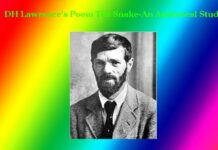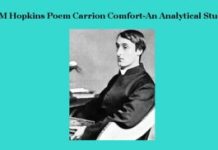John Dryden | Mac Flecknoe as a Mock Heroic Poem
Or
John Dryden’s Mac Flecknoe as a Satire
–Menonim Menonimus
John Dryden | Mac Flecknoe as a Mock Heroic Poem
John Dryden | Mac Flecknoe as a Mock Heroic Poem
A ‘Mock-heroic Poem’ or ‘Mock-epic’ is one in which the subject is mean or trivial while the style of treating the subject is grand or elevated. The author of such a poem makes the subject look ridiculous by wrapping it up in a framework that is utterly inappropriate to its nature. In brief, to say, a mock-heroic poem is a toy adorned with a royal robe. The mock-heroic poems are humorous and satiric in character. It aims at exhibiting the vices and follies of society and individuals with laughter. The mock-heroic poets use various weapons to work out their heroic purpose. They use plain narrative, invectives, and irony with historical allusions and references that look inappropriate but aid to create ridicule and laughter. John Dryden’s Mac Flecknoe is a satire. It has some elements of mock-heroic poems also. In it, he has brought about the follies and vices of some poetasters, especially of Shadwell, an Irish poetaster. In a broad sense, Shadwell is the representative of all those inferior poets and dramatists who claim to have great genius. There are ample episodes that fall into the purview of satire of the mock-heroic kind.
First, we see that the poet has made a comparison of Flecknoe with Augustus the great Roman Emperor. Flecknoe ruled over the kingdom of dullness as Augustus ruled over Rome. This comparison is satiric of a mock-heroic kind. The poet writes:
”…………….like Augustus young
Was call’d to Empire and had govern’d long.”
Secondly, we see that Flecknoe when grew old muses over the question of his succession. He was the monarch of the realm of nonsense and his children were all dull and wretched poetasters and dramatists. His problem was to select that son who would prove to be the dullest. Finally, he resolves that his son Shadwell is the worthiest as he is the dullest of all. The poet writes:
”Shadwell alone my perfect image bear
Mature in dullness from his tender years.”
Thirdly, the poet has compared the bulky body of Shadwell to the huge oak tree that extends its branches in an unpleasant manner. As the oak tree does not possess anything substantial, so is Shadwell. This comparison is highly satirical of the mock-heroic order. The poet says:
”Thoughtless as Monarch Oaks that shade the plain
And spread in solemn state.”
Fourthly, there is a sharp taunt in the use of the word ‘prophet.’ Dryden calls Shadwell a prophet as a ludicrous comparison between Jesus Christ and Shadwell. Jesus Christ was a prophet who showed people the way to a holy life. But Shadwell is a prophet who shows people how to indulge in dull and worthless writings. The poet says:
‘Thou last great prophet of Tautology.’
Fifthly, we see that the poet has attributed the quality of John the Baptist to Flecknoe. John the Baptist came before Jesus Christ to prepare the heart of men and women for acceptance of the great messages of Christ. Flecknoe came before Shadwell to prepare the ground for the display of his son’s (Shadwell) dullness. The poet says:
”Even I a dunce of more renown than they
Was sent before but to prepare the way.”
Sixthly, there is a sharp irony when the poet says that the fishes gathered around the pleasure boat of Shadwell as Dolphins were gathered and charmed by the song of the celebrated Greek poet Arion. But the fishes that gathered round the Shadwell’s boat were only to enjoy the fragments of bread. The poet says:
”Methinks I see the new Arion sail
The lute still trembling.”
Seventhly, the poet Dryden shows the idiocy of Shadwell by depicting the movement of his hands in the fashion of threshing the corn. The term ‘threshing hand’ bears a pointed taunt. Besides, the entire description of the decay of the ancient buildings is presented in a mock-heroic fashion. The poet says:
”An ancient fabric raised to inform the sight
There stood of yore, and barbaric it height.”
Eighthly, the depiction of the coronation of Shadwell to the throne of the realm of dullness is highly satiric of the mock-heroic order. The poet portrays that the goddess of Fame had announced the report of Shadwell’s coronation all over the town and people assembled there from Bunhill to Watling Street. The torn and mutilated works of poor poetasters were strewn over the ground as carpet. Then Shadwell came on the throne which was made up of his voluminous writings. The poet says that he was a hero like Hannibal the Carthage hero who swore to wage eternal war against Rome. Similarly, Shadwell swore that he would keep up his dullness till his death. Then his father adorned him with poppy leaves and flowers. In the meantime, twelve owls flew over his head as it was said that twelve vultures flew over Rumulus, the founder of Rome. The gathering crowd took the flight of the owls as a sign of Shadwell’s bright future. All these descriptions and imageries of Hannibal, the twelve owls, Rumulus etc. are not only satiric but also heroic in an ironic sense.
Besides the subject matter and the treatment of the subject matter, the style of the poem is grand to the mock-heroic order. The poet has employed a heroic couplet which consists of a pair of lines with the same rhyme order, each line comprises of five iambic feet to the poem in order to render mock-heroic ingredients to it. In addition to this, the poet has used lots of historical as well as mythological allusions and references as- Augustus, Arion, Rumulus, Hannibal, Jesus Christ, John the Baptist etc. along with these, the poet makes ample allusions and references from contemporary history of poets, dramatists and musicians like- Johnson, Heywood, Shirley, St. Andre, Villerus etc. All these references and allusions have added flavour to the poem and enhanced its grandeur but in a mock-heroic way.
From the above illustration, we can come to the conclusion that Dryden’s ‘Mac Flecknoe’ is a satire as well as a successful mock-heroic poem. 0 0 0
Mac Flecknoe as a Mock Heroic Poem
Read More: Salient Features of John Donne’s Poetry
Mac Flecknoe as a Mock Heroic Poem
N. B. This article entitled ‘John Dryden’s Mac Flecknoe as a Mock Heroic Poem’ originally belongs to the book ‘Critical Essays on English Poetry‘ by Menonim Menonimus. Mac Flecknoe as a Mock Heroic Poem
Books of Literary Criticism by M. Menonimus:
- World Short Story Criticism
- World Poetry Criticism
- World Drama Criticism
- World Novel Criticism
- World Essay Criticism
- Indian English Poetry Criticism
- Indian English Poets and Poetry Chief Features
- Emily Dickinson’s Poetry-A Thematic Study
- Walt Whitman’s Poetry-A Thematic Study
- Critical Essays on English Poetry
- Tawfiq al-Hakim’s Novel: Return of the Spirit-An Analytical Study
- Tawfiq al-Hakim’s Novel: ‘Yawmiyyat Naib Fil Arayaf’-An Analytical Study
- Analytical Studies of Some Arabic Short Stories
- A Brief History of Arabic Literature: Pre-Islamic Period …











